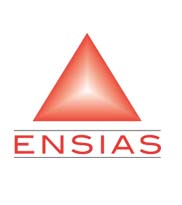- Accueil
-
L'Ecole
-
FORMATIONS
-
FORMATION INGENIEUR
-
Nouvelles filières offertes
- Ingénierie Intelligence Artificielle (2IA)
- Smart Supply Chain & Logistics (2SCL)
- Business Intelligence & Analytics (BI&A)
- Cybersécurité, Cloud et Informatique Mobile (CSCC)
- Data and Software Sciences (D2S)
- Génie de la Data (GD)
- Génie Logiciel (GL)
- Ingénierie Digitale pour la Finance (IDF)
- Smart System Engineering (SSE)
- REGLEMENT DES ETUDES DE L’ENSIAS CYCLE INGENIEUR
-
Nouvelles filières offertes
-
FORMATION INGENIEUR
- FORMATION CONTINUE
-
Recherche
- INTERNATIONAL
- ENTREPRISES
- VIE ESTUDIANTINE
- BIBLIOTHEQUE
LES DERNIÈRES INFORMATIONS
Communizer: A collaborative cloud-based self-protecting software communities framework - Focus on the alert coordination system
| Titre | Communizer: A collaborative cloud-based self-protecting software communities framework - Focus on the alert coordination system |
| Publication Type | Journal Article |
| Year of Publication | 2022 |
| Authors | Iraqi, O, Bakkali, HE |
| Journal | Computers and Security |
| Volume | 117 |
| Mots-clés | Autonomic Computing, collaboration, Coordination systems, Economic and social effects, Intrusion detection, Mape, MAPE-K, Self protecting, Self-protecting software, Selfishness, Software community, Trust, Trusted computing |
| Abstract | Popular software has always been appealing to adversaries, as related vulnerabilities are synonymous with millions of exposed businesses. Collaborative intrusion detection, as well as software self-protection, try to alleviate this situation. However, they lack either autonomy and adaptation, or Internet-scale oversight and mitigation. In this work, we present Communizer: a collaborative cloud-based framework that creates communities of self-protecting software across organizations. It allows community members to turn their common weaknesses into collaborative and proactive self-protection, empowering them to detect intrusions, exchange alerts, and anticipate attacks. We start by integrating multiple autonomic MAPE-K loops through cloud-based coordination, and a novel hierarchical, regional coordination pattern (HRCP), optimizing scalability, resiliency, accuracy and privacy. Then, we design a trust-based multi-level alert coordination system (TMACS), as well as a lightweight alert coordination message exchange format (ACMEF). At its core, TMACS aggregates, validates, and shares security alerts among community members while fostering agreement and managing trust. It also addresses insider attacks by detecting and blacklisting rogue members. Moreover, TMACS identifies and neutralizes selfish members through a specifically designed probabilistic model. The analysis, optimization, and evaluation of TMACS show a good trade-off between the precision and recall of untrustworthy and selfish members detection. More importantly, we demonstrate a drastic reduction of monitoring loads on community members while ensuring a high collaborative attack detection and anticipation rate, even for small-scope attacks. © 2022 Elsevier Ltd |
| URL | https://www.scopus.com/inward/record.uri?eid=2-s2.0-85127747467&doi=10.1016%2fj.cose.2022.102692&partnerID=40&md5=246bfc07692396ec6709a73d31126fb6 |
| DOI | 10.1016/j.cose.2022.102692 |
Revues:
LIENS UTILES
Localisation
Contactez-nous
ENSIAS
 Avenue Mohammed Ben Abdallah Regragui, Madinat Al Irfane, BP 713, Agdal Rabat, Maroc
Avenue Mohammed Ben Abdallah Regragui, Madinat Al Irfane, BP 713, Agdal Rabat, Maroc
![]() Télécopie : (+212) 5 37 68 60 78
Télécopie : (+212) 5 37 68 60 78
![]() Secrétariat de direction : 06 61 48 10 97
Secrétariat de direction : 06 61 48 10 97
Secrétariat général : 06 61 34 09 27
Service des affaires financières : 06 61 44 76 79
Service des affaires estudiantines : 06 62 77 10 17 / n.mhirich@um5s.net.ma
CEDOC ST2I : 06 66 39 75 16
Résidences : 06 61 82 89 77
- Compteur de visiteurs:638,420
Education - This is a contributing Drupal Theme
Design by WeebPal.
Design by WeebPal.



































